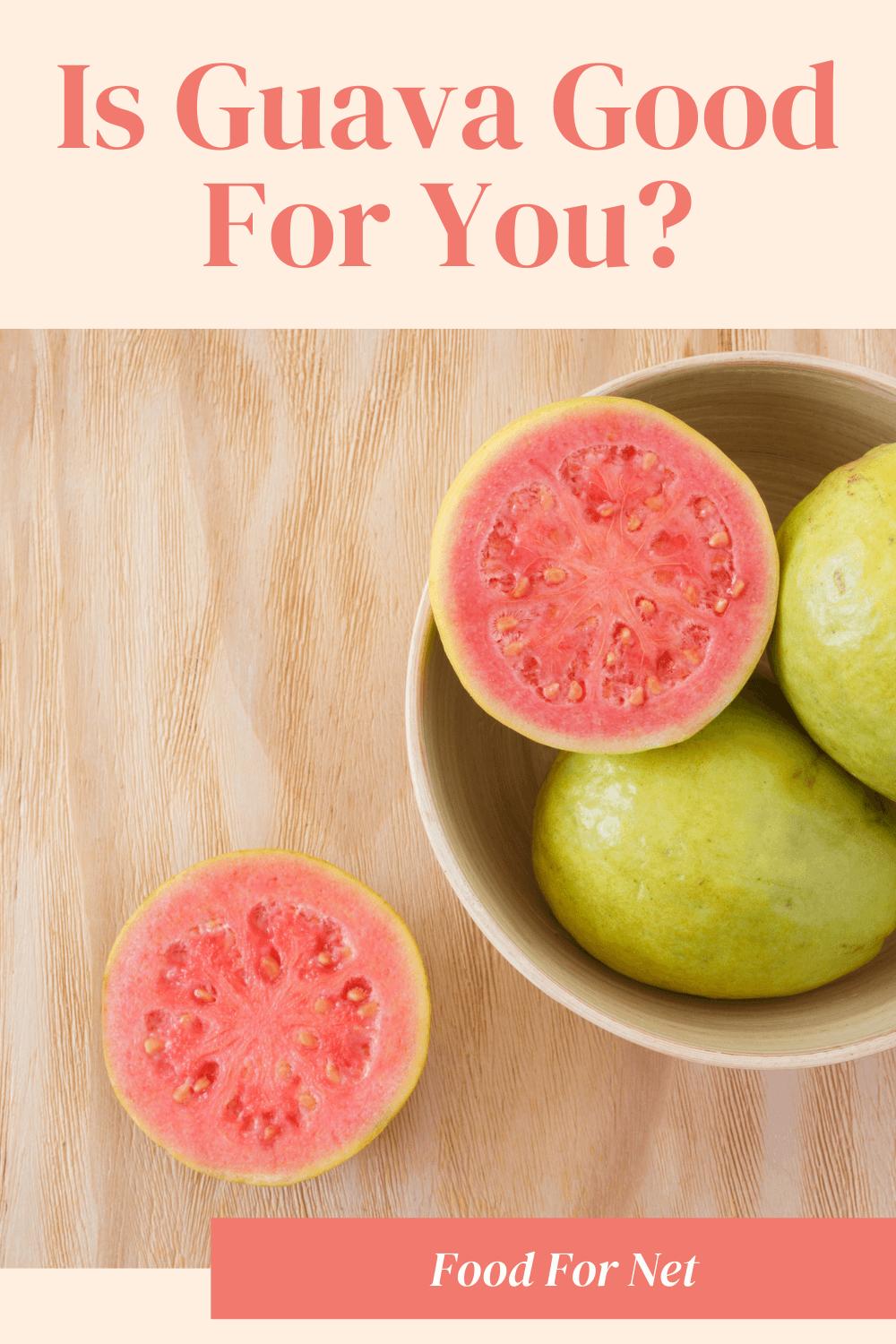
Guava is an exciting tropical fruit, one that’s delicious, unusual, and that most people adore, but is guava good for you? The fruit is sometimes described as being fruity or floral, or as being somewhere between the flavor of strawberries and pears. In the end, though, it’s a treat that you simply need to try for yourself. Trust us, you won’t be disappointed.
Still, while flavor matters, it’s only one part of the equation. If you’re going to eat something regularly, it’s also important to think about the health effects. So, is guava good for you?
The most obvious answer here is yes, given that we’re talking about a natural fruit, something that’s unprocessed and hasn’t been genetically modified. Even so, there’s more than meets the eye for most foods. For example, delicious strawberries are often contaminated with pesticide residues, while spinach is incredibly high in oxalates.
Today we’re going to take a close look at guava and see if this fruit has any skeletons in its closet.
Is Guava Good For You?
- Guava Nutrition
- Types Of Guava
- Benefits Of Guava
- How Guava Could Be Harmful
- Is Guava Low In FODMAPs?
- Is Guava Juice Healthy?
- Do Guava Leaves Offer Benefits?
- Final Thoughts
Guava Nutrition
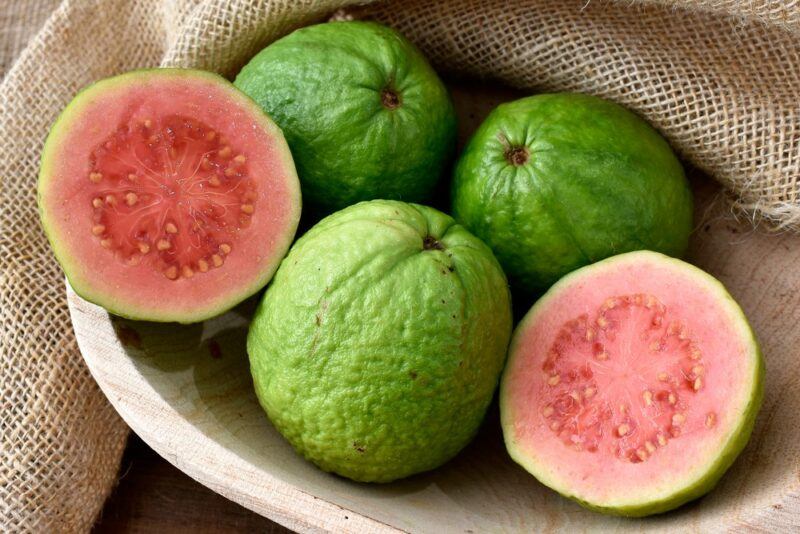
Before we dig into the benefits of guava, let’s look at the nutritional profile, including the vitamins, minerals, and macronutrients. After all, the nutrients in fruit and vegetables are where many of their benefits come from.
Here’s the nutrient profile for a whole guava:
- Calories: 37.4
- Carbs: 7.9 grams
- Fiber: 3.0 grams
- Fat: 0.5 grams
- Protein: 1.4 grams
- Vitamin C: 209% of your daily intake
- Potassium: 7% of your daily intake
- Folate: 7% of your daily intake
- Vitamin A: 7% of your daily intake
Other nutrients include copper, magnesium, vitamin E, phosphorous, and vitamin K, all in smaller quantities.
This isn’t an amazing nutrient profile, as you’re getting small amounts of most vitamins and minerals (aside from the impressive vitamin C content). Still, fruit tends to be mostly water, which means the nutrient composition by weight is generally on the low side.
You’re still getting some nutrients anyway and these all add to your daily intake, keeping you at the top of your game.
Types Of Guavas
The most well-known guavas are pink and red. They’re often known as desert guava and they tend to have a sweet flavor.
There are also guavas with white or yellow flesh instead. These tend to be more acidic and have a much more subtle flavor.
There are numerous individual varieties within each of these types, with their own flavors and nutritional profiles. Still, the nutrients are similar regardless of the type you choose, so you’re always going to see plenty of health benefits.
Aside from the flavor, the main difference between the types is that guavas with pink and red flesh are likely to be higher in antioxidants than those with lighter colored flesh. This difference makes red/pink guavas the healthiest choice, although both types have much to offer.
Benefits Of Guava
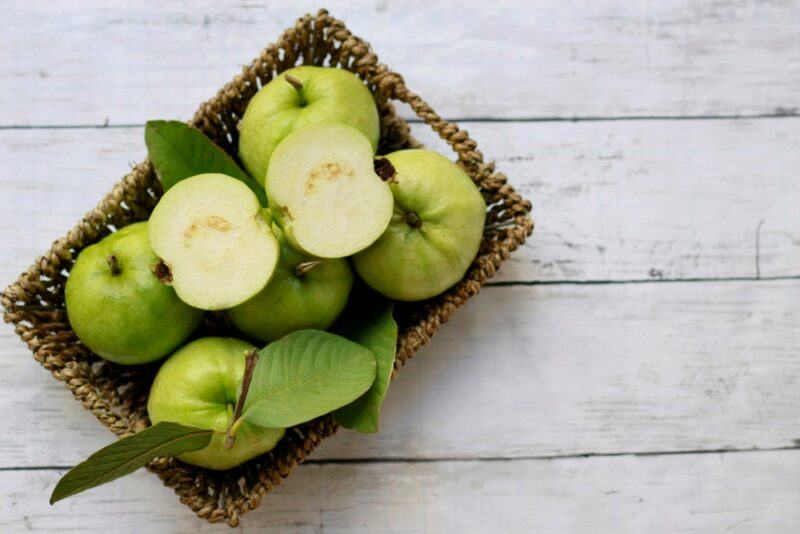
Helps With Your Digestion
Guava is a decent source of fiber, with a single fruit offering around 3 grams of fiber, which is roughly 12% of your daily fiber goals. Fiber is always relevant, as it’s a critical part of our digestive system.
Not consuming enough fiber leads to symptoms like bloating, constipation, high cholesterol levels, and dramatic changes to your blood sugar levels. Those aren’t outcomes that you want. Some of them could even increase your risk of disease.
On the other hand, getting enough fiber decreases your risk of constipation, while helping to keep your cholesterol and blood sugar levels where they should be. While a single guava isn’t anywhere close to your daily fiber targets, every little bit counts (besides, most of us need more fiber than we’re currently consuming).
Contains Antioxidants
If you’re looking for more antioxidants, guava is an excellent choice. This shouldn’t be surprising, as antioxidants are common in brightly colored fruits and vegetables.
I’m sure you’ve heard about all the possible benefits, like how antioxidants can decrease disease risk, how they might even help to fight cancer and increase the length of your life. Some of these benefits are overhyped, but even so, antioxidants are incredibly important.
We need antioxidants because modern diets and lifestyles can promote high levels of oxidative stress, which increases the risk of oxidative damage to our DNA and cells. Such damage can then increase the risk of disease, so it’s important to keep oxidation in check.
Antioxidants aren’t the solution to every problem, of course, they’re simply one important feature in a healthy diet, and guava is an easy way to increase antioxidant intake. Consume plenty of other fruits and vegetables as well and you’re well on your way to being healthy.
Could Be Relevant For Your Heart
Despite being a sweet fruit, guavas can help to decrease heart disease risk. The antioxidants we talked about before play a role in this effect, as they protect your heart from oxidative damage.
The fiber from guava can also help to keep your cholesterol levels in balance. Some of the nutrients are relevant too, particularly potassium, which helps to lower your blood pressure.
A Healthy, Low Calorie Snack
Guava is surprisingly fantastic as a snack. Not only is it easy to eat, but the fruit is also low in calories (less than 40 grams for an entire guava).
There’s also the fiber to think about. The 3 grams of fiber per fruit helps to decrease the blood sugar impact of guava. This means that even diabetics can enjoy guava.
That said, if you are diabetic, try pairing the fruit with a handful of nuts. Doing so reduces the blood sugar impact even further. As always, serving size matters, so you should probably stick to a single guava, rather than having multiple. This helps to ensure there isn’t too much sugar in your system at any time.
Could Help With Your Immune System
The link between vitamin C and your immune system is well-established. While the vitamin is never going to cure the common cold, it might decrease the duration of your illness and improve your body’s ability to fight off infections.
Guava is exceptional here, giving you more than 200% of your vitamin C intake from a single fruit. That’s even more than you get from oranges.
How Guava Could Be Harmful
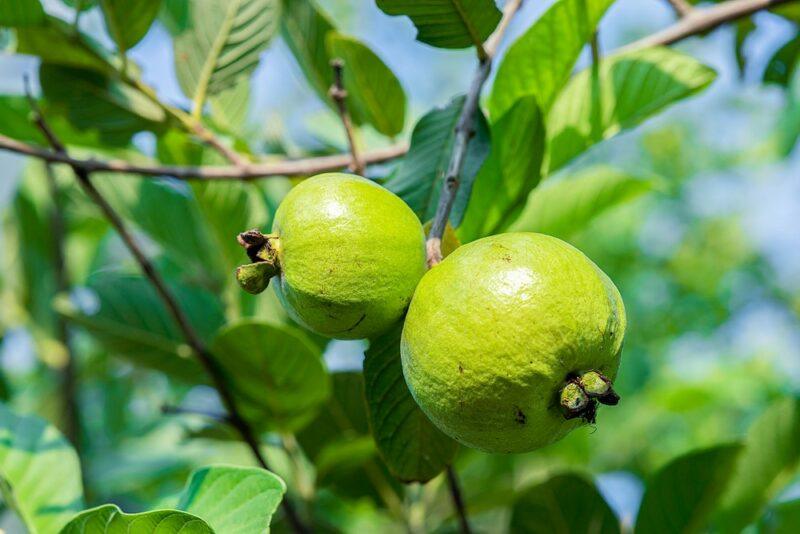
The Carb Content
Guava is fairly high in carbs, with a single fruit containing almost 8 grams of carbs. Only 3 grams of this is from fiber, leaving almost 5 net grams of carbs per fruit.
The carb content is worth talking about, as carbs are so controversial these days. They’re often linked to fluctuations in your blood sugar levels and increased inflammation, effects that are never good for your health.
For anyone on a keto diet, the carbs in guava may be a deal breaker. You’d need to keep your portion sizes very small indeed to fit guava onto your diet. Is doing so even worth it? There are plenty of other lower carb fruits that are delicious and just as good for you, like raspberries and blackberries.
What about the rest of us?
Well, if you’re not following a low carb diet, then the carbs in guava aren’t such a big deal. The fiber in the fruit helps to offset the digestible carbs anyway, so you don’t get a huge blood sugar impact. Plus, the antioxidants and other nutrients in the fruit all provide benefits.
Could Lead To Side Effects
While guava is safe for most people, it can sometimes lead to side effects, including bloating and stomach cramps. These often happen because of the fiber in the fruit, as your body may need time to adjust if you suddenly change your fiber intake.
Thankfully, such issues are easily avoided by taking it slowly and making sure you drink enough water.
It’s also possible to be allergic to guava, which will give you symptoms like swelling of your tongue, itching in your mouth, light headiness, and nausea. While guava allergies are rare, they do happen, so it’s always important to pay attention to any symptoms.
Is Guava Low In FODMAPs?
FODMAPs are a common concern when thinking about fruits and vegetables. The term refers to fermentable carbs, ones that aren’t a problem for most people, but may contribute to side effects like gas and stomach cramps for people with irritable bowel syndrome.
Anyone with a sensitive digestive system might choose to focus on low FODMAP foods to help keep their symptoms at bay. However, finding low FODMAP foods isn’t always simple, as the FODMAPs can vary depending on ripeness, processing, variety, and other factors.
Testing for guava shows that FODMAP content tends to decrease as the fruit ripens. As a result, fully ripe guava tends to be low in FODMAPs, while unripe guava is much higher in FODMAPs.
Guava juice hasn’t been tested for FODMAPs. However, it should be low in FODMAPs as well, as long as you’re ripe guavas rather than unripe ones. You might also need to keep your portion sizes small.
Is Guava Juice Healthy?
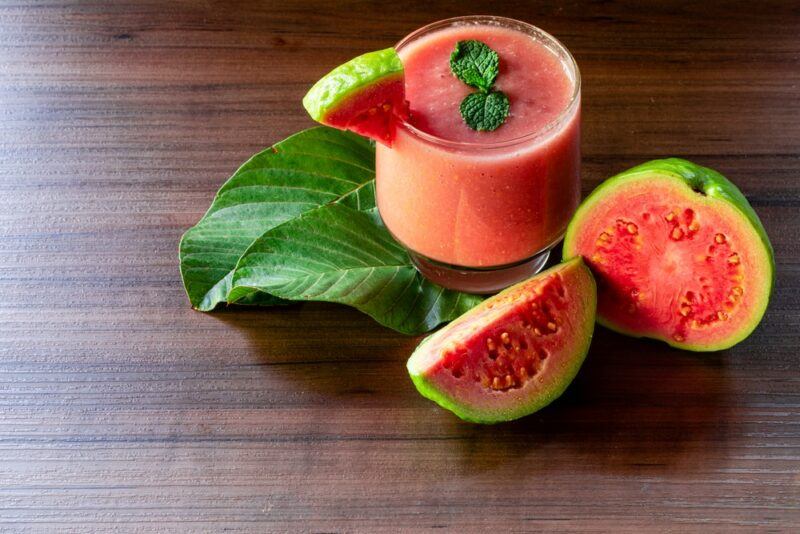
Fruit juice provides you with most of the healthy compounds found in fresh fruit, aside from the fiber. This effect does make the guava juice a more potent source of nutrients than fresh guava, but it’s not all good news.
The problem is that guava juice tends to be calorie dense as well. Not surprising, right? You’re getting all the nutrients from multiple guava fruits in a single glass of the juice, which includes all the sugar from the fruits as well.
This sugar changes everything. It takes guava juice away from being a fantastic source of nutrients and towards being a sugar bomb instead.
The juice still offers more benefits than a glass of soda, as you’re at least getting some nutrients and antioxidants. Don’t fool yourself though, guava juice is never going to be as powerful as the fresh fruit. If you are going to use the juice, it’s best to keep your portion sizes small and make sure you can fit the calories into your diet.
Do Guava Leaves Offer Benefits?
So far, we’ve been focusing on the guava fruit, but the leaves are even more famous for health. You can take advantage of them by using guava leaf extract or by making herbal tea from guava leaves.
In particular, the leaves have been linked to:
- Decreased blood sugar levels after a meal, an effect that could even lower the risk of diabetes.
- Improvements to blood cholesterol, including decreasing LDL cholesterol levels and increasing HDL cholesterol, along with decreases in blood pressure levels.
- Decreased pain from menstrual cramps.
- Could help to treat diarrhea. Plus, the water in guava leaf tea is useful for rehydrating following diarrhea.
- May help with fighting the flu as well, due to antiviral properties.
More research is needed for all these effects. Still, there’s enough evidence to make the leaves well-worth trying.
That said, caution is needed.
If you’re making guava leaf tea, make sure the leaves you use are free from pesticide contamination and have been washed well. Try to have the tea every so often, rather than multiple cups per day, as herbal teas can have cumulative and unexpected effects.
If you’re relying on guava leaf extract instead, make sure the company is reliable. This is critical because the supplement industry isn’t well-regulated and some products are contaminated. Choosing a poor-quality product could even put your health at risk.
Final Thoughts
Guava is a delicious fruit that offers plenty of benefits and few risks. Even guava leaves are important, providing a surprising array of benefits.
The fruit does contain some sugar, but this shouldn’t be an issue for most people. After all, we know that whole fruit end up promoting health, rather than causing harm.
The most important thing is to pay attention to your overall diet and lifestyle. Most foods can be good for you, as long as you’re not overdoing it with sugar, carbs, or calories. Thankfully, eating a healthy and balanced diet isn’t that difficult. You simply need to include plenty of plant-based foods and watch out for anything processed or high in fat.
Frequently Asked Questions
Is Guava Good For Diabetics?
Guava is a useful fruit for diabetics in multiple ways and can even help to reduce blood sugar levels. It also has a low glycemic index and glycemic load, which is perfect.
At the same time, fresh fruit provides plenty of fiber and antioxidants. These are valuable for keeping you healthy and why you should still eat fresh fruit regularly, even if you have diabetes.
Is Guava Acidic?
Yes. The pH of guava is between 3 and 4, which makes them distinctly acidic. But, like many fruit, guava does have an alkaline effect in the body once it has been digested.
The acidic nature could mean that guava triggers acid reflux symptoms. However, sticking to small servings can help you avoid these while still enjoying the fruit.
Is Guava Good For Weight Loss?
Fruit is always good for weight loss, as long as it’s consumed in moderation. After all, it provides you with plenty of nutrients, antioxidants, and fiber. These are all crucial for long-term health and weight loss.
Besides, guavas have a low calorie natural sweet treat. This makes them much healthier than all the processed candy out there.
Is Guava Keto Friendly?
Guava works surprisingly well for keto, with a whole guava only contains around 5 net grams of carbs. While this is a decent number of carbs, it’s still less than many other types of fruits. Besides, you can always eat half a guava, rather than the whole thing.
Does Guava Cause Gas?
Guava doesn’t cause gas to the same extent as beans, cauliflower, or other famously gassy foods. However, it can still lead to bloating and excess gas, partly because of the amount of fructose.
If you experience this side effect, it’s best to cut down your guava intake. Try having just half a guava or even a quarter. You might be able to increase your intake further once your body has adjusted.












 Is Plant-Based Meat Good For You?
Is Plant-Based Meat Good For You?
Leave a Reply